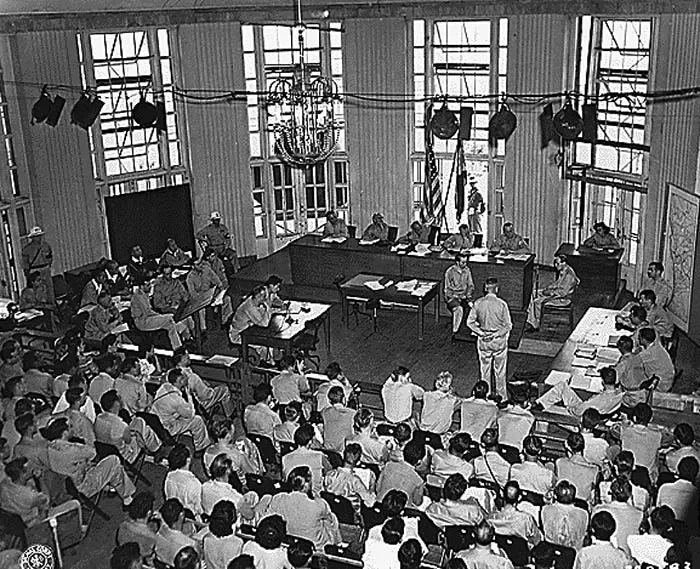Testimony of Jose Mercado of San Jose, Batangas on How His Family suffered at the Hands of the Japanese in 1945
[TRANSCRIPTION]
This page contains the testimony of one Jose Mercado of San Jose, Batangas on how the Japanese killed members of his family. The pages contained herein are now declassified and were part of compiled documentation1 of war crimes trials conducted by the United States Military Commission after the conclusion of World War II. Most of the testimonies were translated from Tagalog and have been corrected for grammar by Batangas History, Culture and Folklore where possible. The pagination is as it was contained in the original document for citation purposes.
 |
| Photo taken during the war crimes trials in Manila. Image credit: U.S. National Archives. |
[p. 44 ]
R E S T R I C T E D
Q Please state your full name, age, address and nationality.
A Jose Mercado, 30 years old, Barrio Banaybanay I, San Jose, Batangas Province, P.I., Filipino.
Q What is your occupation?
A Merchant.
Q Do you intend to remain at your present address, and if not, how can your whereabouts in the future be ascertained?
A The Mayor of the Municipality of San Jose, Batangas Province will always know my whereabouts. I will leave him my address.
Q Did you suffer any mistreatment at the hands of the Japanese on or about March 18, 1945?
A I was not mistreated myself, but three members of my family were killed and three others wounded by the Japanese at that time.
Q Will you relate fully the events that occurred in Banaybanay I on that date as you remember it, regarding the mistreatment of these six members of your family?
A One afternoon, about six o’clock on March 18, 1945, the front-line Japanese soldiers passed on the street at the gate of my home in Banaybanay I. There were ten Japanese including an officer. The ten stopped near our gate and went into our yard. My grandmother, Genoveva Custodio, aged 85, went downstairs to urinate.
The officer then ordered his men to go away, which they all did except one who was left behind. My grandmother, who had a poor [eye]sight, called this Japanese to come to her, thinking perhaps that he was one of her grandchildren. The Japanese called his companions. My grandmother then realized her mistake. She ran upstairs and locked the door behind her.
The three Japanese soldiers went up the stairs and forced the door open. I heard my mother beg the Japanese not to kill them — my mother, Rosario Aguila, aged 50; my father, Arcadio Mercado, aged 65; my grandmother, Genoveva Custodio, aged 85; my aunt, Josefa Aguila, aged 37; my sister Felicidad and Pacita Mercado, aged 14 and 7, respectively — because they had done nothing.
Then, I heard screams. I heard my father’s scream first. It suddenly stopped. I surmised my father died immediately. I heard my mother’s scream next. Then, I could no longer distinguish the screams because there were many of them. Then, everything became quiet. I think it was half an hour after the three Japanese went into the house. The Japanese left thinking all those six persons in the house were dead.
About eight o’clock, same day, I went to my father’s house. I found him, my mother and my grandmother all dead. My father, who was dead, had one bayonet wound below the left nipple; my mother had three bayonet wounds, one on the breast and two below the left nipple; my grandmother had one bayonet wound in the abdomen.
[p. 45]
R E S T R I C T E D
My aunt and two sisters were all wounded but alive. My aunt had three bayonet wounds, one below the left nipple and two on the buttocks, one on each; my sisters had bayonet wounds, one each on the left knee. I took these three wounded to my house. These three were treated by the Americans in the market of San Jose, Batangas Province.
Q What did you do with the three dead bodies?
A I had no one to help me bury them. It was about 15 days afterwards that I buried them in our backyard. I burned my father’s house.
Q Do you know the name of any of the ten Japanese you saw enter your father’s yard on March 18, 1945?
A No.
Q Can you describe any of them?
A I can describe only the officer. He wore a saber. He was about six feet tall, weighed about 165 pounds, wore a helmet so I could not tell anything about his hair, wore no glasses, was fair-complexioned, had [a] high-bridged nose and wore a beard.
Q How do you know that he was an officer?
A Because he wore a saber and seemed to be in charge of the group.
Q Do you know to what unit or organization they belonged?
A No.
Q Can you describe their insignia?
A No.
Q Do you know what provoked those Japanese to do this to the members of your family?
A No, they were all peaceful citizens.
/t/ JOSE MERCADO
COMMONWEALTH OF THE PHILIPPINES
PROVINCE OF BATANGAS
TOWN OF SAN JOSE
/t/ JOSE MERCADO
/t/ ALLEN H. PEOPLES, Capt., CAC
Investigating Detachment.
[p. 46]
R E S T R I C T E D
C E R T I F I C A T E
|
Municipal Bldg., San Jose, Batangas Province, P.I. |
/s/ Allen H. Peoples /t/ ALLEN H. PEOPLES, Capt., CAC |
| 27 October 1945 |
/s/ Charles C. Thompson /t/ CHARLES C. THOMPSON, Capt., TC |
